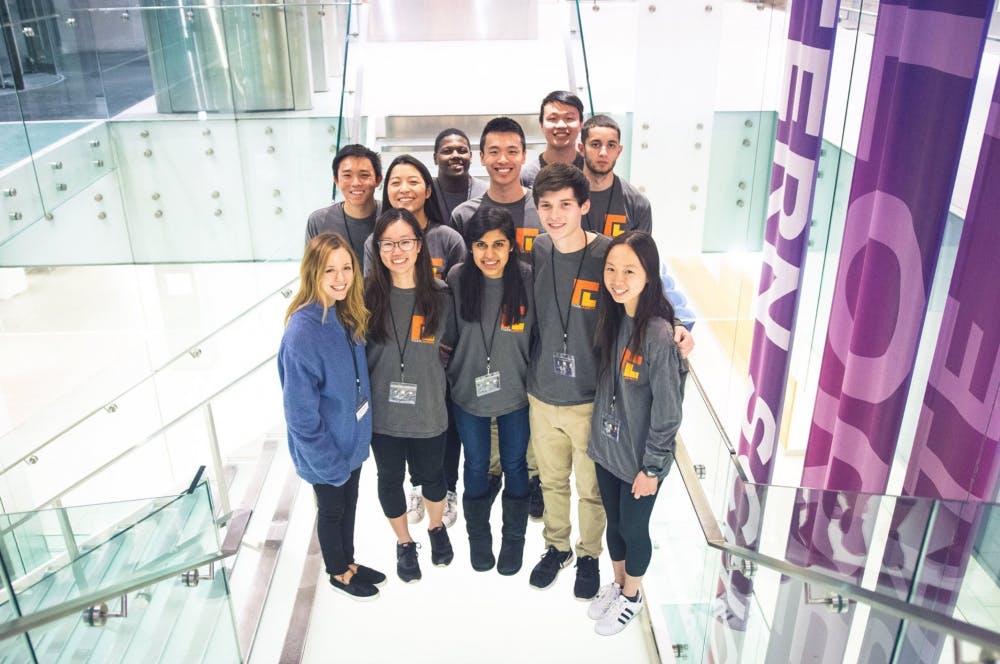An elite team of computer science majors from the University is taking its project to the finals of TigerLaunch, the nation’s largest student-run entrepreneurship competition.
“We all have our shared interests in the sense that we believe in the power and the use of technology to solve some of the problems in developing and developed countries,” said Felix Madutsa ’18.
The co-founders of the BlockX team are Madutsa, Avthar Sewrathan ’18, and Richard Adjei ’18. The students have known and worked with one another on various projects since their freshman year, so the idea to collaborate on a business came naturally.
“We’ve been partnering together since COS 126,” Computer Science — An Interdisciplinary Approach, said Sewrathan. “We’ve known each other for such a long time that we knew we’d want to start a company together.”
Their company’s mission is to help people reclaim their privacy and data on the internet. To achieve this, their program uses blockchain, a digital ledger in which transactions made in bitcoin or another cryptocurrency are recorded. Their particular blockchain-based naming and storage system is called Blockstack.
“A lot of people talk about blockchain to take power from financial middlemen; we’re just trying to use blockchain to take power from information middlemen, the people who supply most information you consume,” Adjei said.
He added that this goal is especially important in the cases of developing countries, where it can be difficult to obtain information that isn’t influenced by the government or another higher power.
The company focuses on communication applications. BlockX uses blockchain to create two products: a decentralized encrypted messaging and payments platform (similar to WeChat, a communication and messaging platform popular in Asia) and a decentralized social network or microblogging platform, similar to Twitter.

“We’re trying to take away that power the government and that middleman has over the people’s thinking so they can actually make the thoughts that are necessary to push themselves and the human race as a whole forward,” said Adjei.
Sewrathan described the microblogging platform as a social media outlet in which users have control over their own data without having to rely on larger actors like Facebook and risk their data being shared. Sewrathan referenced the recent Cambridge Analytica scandal as a “timely example.”
“Only now are people realizing that this is not just something that academics think about but [something] that actually affects people in the real world,” said Sewrathan.
The group had been thinking about the potential uses of Blockchain far before the competition ever began, and much of their respective independent work has looked into its possibilities. Using a similar idea, the team won a Princeton Pitch competition in December 2017, indicating that their idea had potential for market success. The group placed in the top-five competitors at the TigerLaunch regional in New York City in February 2018.

The group emphasized that their idea was not solely for the competition in any sense. Rather, they saw the competition as a way to use one of the University’s many resources to receive feedback and continue to improve. The competition also provides them and other competitors with a network of experts and other students to collaborate with.
“TigerLaunch gives you access to people who’ve had a lot of crazy ideas pitched to them,” Madutsa said. “If they say this idea is not that crazy, or they think it’s viable, it gives us … a feeling of validation.”
When asked what advice they would give to aspiring entrepreneurs, the team emphasized taking notice of the resources that are on campus and using them, forming connections with professors, immersing oneself in one’s interests, and developing and testing ideas in small ways.
“You think that one day you’re gonna wake up and magically get this idea, which is not the case,” Sewrathan said. “You need to work on an idea and go back and refine it.”
In the course of the TigerLaunch competition, teams from many different universities present in front of a diverse panel of judges to compete for $30,000 dollars in prize money and an opportunity to pitch to top venture capital firms.
The TigerLaunch competition is sponsored by the Princeton Entrepreneurship Club.
“We’re one of the only competitions that’s run by students, for students,” said Sophie Troyka ’19, the lead of the marketing team for the competition. “Our key words are grit and vision.”
TigerLaunch became a national competition three years ago when it expanded to include teams from colleges other than the University. Students enter the competition by submitting an application and video explanation of their company and, if accepted, go on to the regional competitions.
This is TigerLaunch’s first year as an international competition, accepting teams from Paris regionals in addition to the regionals in New York City and Chicago.
When asked what the goal of the competition was at the time of its founding, Pelumi Odimayo ’19, a member of the TigerLaunch marketing team, said that its goal was “building a community of student founders and entrepreneurs across the United States.”
The finals of the competition are being held on campus on April 13 and 14.








